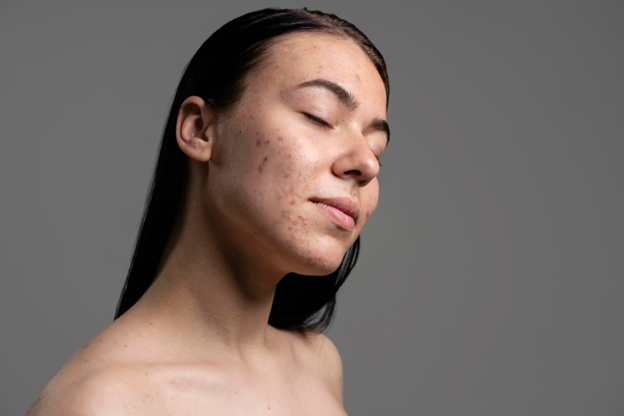Acne is one of the most common skin conditions, affecting people of all ages, but it is particularly prevalent during adolescence and young adulthood. While acne is often associated with teenage years, adults can suffer from acne too, sometimes well into their 30s or even 40s. While it may seem like a mere cosmetic issue, acne can have a profound impact on self-esteem and mental well-being. Understanding the causes of acne, its symptoms, and how to treat it effectively can help individuals achieve clearer, healthier skin. In this blog, we’ll explore the root causes of acne, the best treatment options available, and why Dermax Skin and Hair Transplant is the right place to seek professional help.
What Is Acne?
Acne is a skin condition that occurs when hair follicles become clogged with oil, dead skin cells, and sometimes bacteria. This leads to inflammation and the formation of pimples, blackheads, and whiteheads. The most common areas affected by acne are the face, back, chest, and shoulders, though it can appear on other parts of the body as well.
Acne is not just about pimples. It can cause redness, swelling, and scarring if left untreated. While it’s often seen as a temporary issue, acne can persist for years, with some individuals experiencing ongoing flare-ups even into adulthood.
Causes of Acne
Acne develops when there is an imbalance in the skin’s natural processes. There are several factors that contribute to this imbalance:
- Hormonal Changes: During puberty, the body goes through hormonal shifts that can increase oil production in the skin. This is why acne is so common in teenagers. Hormonal changes that occur during menstruation, pregnancy, and with the use of birth control can also trigger or worsen acne.
- Excess Oil Production: The sebaceous glands in the skin produce oil to keep the skin hydrated. However, when these glands overproduce oil, it can mix with dead skin cells and clog hair follicles, leading to acne breakouts.
- Bacteria: Propionibacterium acnes, a bacterium naturally found on the skin, can multiply in clogged pores, causing inflammation and infection. This leads to the redness, pus, and swelling associated with acne.
- Diet: Studies have suggested that certain foods may trigger acne flare-ups. Diets high in refined sugars and dairy products may contribute to acne in some people. While the connection between diet and acne is still being researched, it’s always a good idea to monitor your food intake and see if changes in your diet help reduce breakouts.
- Stress: While stress doesn’t directly cause acne, it can exacerbate the condition. Stress increases the production of certain hormones, such as cortisol, that can lead to an overproduction of oil and worsen acne symptoms.
- Genetics: If your parents had acne, you may be more likely to develop it as well. Genetic predisposition plays a significant role in acne susceptibility.
- Medications: Certain medications, such as corticosteroids or anabolic steroids, can contribute to acne development. Additionally, some drugs, like lithium, may worsen acne symptoms.
Symptoms of Acne
The severity and symptoms of acne can vary from person to person. Common signs of acne include:
- Blackheads: These are clogged pores that are open at the surface. They appear black due to oxidation of the oils in the pores.
- Whiteheads: Whiteheads are similar to blackheads but are closed at the surface, causing a white bump on the skin.
- Papules: Small, red bumps that may be tender to the touch.
- Pustules: Pimples that contain pus, typically surrounded by redness and inflammation.
- Nodules: Hard, painful lumps that form deep under the skin’s surface.
- Cysts: Large, pus-filled lumps that can cause significant pain and scarring.
Treatment Options for Acne
There are numerous treatments available for acne, ranging from over-the-counter products to professional dermatological interventions. The best treatment depends on the severity and type of acne, as well as individual skin type and needs. Here are some of the most common treatments:
- Over-the-Counter Treatments:
- Benzoyl Peroxide: This is one of the most common ingredients in acne treatments. It works by killing acne-causing bacteria and helping to reduce inflammation.
- Salicylic Acid: This ingredient helps unclog pores by exfoliating the skin and preventing the formation of blackheads and whiteheads.
- Retinoids: Retinoids are vitamin A derivatives that help to speed up skin cell turnover and prevent clogged pores. These can be found in both over-the-counter and prescription formulations.
- Sulfur: Sulfur helps to dry out excess oil and can be effective for mild acne.
- Prescription Treatments:
- Topical Antibiotics: These help reduce bacteria on the skin and can reduce inflammation and redness associated with acne.
- Oral Antibiotics: For more severe acne, oral antibiotics can help control the bacterial growth inside the skin.
- Oral Contraceptives: Birth control pills that contain both estrogen and progesterone can help regulate hormones and reduce acne in some women.
- Isotretinoin (Accutane): This powerful oral medication is reserved for severe, cystic acne that hasn’t responded to other treatments. It works by reducing oil production, shrinking sebaceous glands, and preventing clogged pores.
- Professional Treatments at Dermax Skin and Hair Transplant:
- Chemical Peels: Chemical peels use a solution to remove the outer layer of dead skin, helping to clear clogged pores and reduce acne scars.
- Laser Therapy: Laser treatments can target deep layers of skin, reducing oil production and inflammation. It can also help with scarring.
- Microneedling: This treatment involves tiny needles that stimulate collagen production, helping to improve skin texture and reduce scarring from acne.
- LED Light Therapy: LED light therapy helps reduce acne-causing bacteria and reduces inflammation.
- Customized Skincare Plans: At Dermax, we create tailored treatment plans that include prescription skincare products, lifestyle recommendations, and in-office procedures to treat acne effectively.
- Natural Remedies:
- While not a substitute for medical treatments, natural remedies such as tea tree oil, aloe vera, and honey can sometimes help soothe acne-prone skin. Always consult with a dermatologist before using these remedies.
Preventing Acne Breakouts
While it may not always be possible to completely prevent acne, there are steps you can take to reduce the likelihood of breakouts:
- Cleanse your face gently: Use a mild cleanser twice a day to remove dirt, oil, and makeup.
- Avoid touching your face: Picking at pimples or touching your face frequently can introduce bacteria and worsen acne.
- Use non-comedogenic products: Choose skincare and makeup products labeled “non-comedogenic” to ensure they don’t clog pores.
- Stay hydrated and eat a balanced diet: A healthy diet rich in vegetables, fruits, and lean proteins can support skin health.
Conclusion
Acne can be a challenging condition, but it’s treatable with the right approach. Whether you’re dealing with mild breakouts or severe cystic acne, a customized treatment plan is essential to clear your skin and restore your confidence. At Dermax Skin and Hair Transplant, our team of expert dermatologists and skincare professionals offer advanced solutions tailored to your unique needs. From in-office treatments to personalized skincare regimens, we’re here to help you achieve clearer, healthier skin.
Don’t let acne control your life. Contact Dermax Skin and Hair Transplant today to schedule a consultation and take the first step toward clearer, more confident skin. Our experts will guide you through the most effective treatments tailored just for you!

